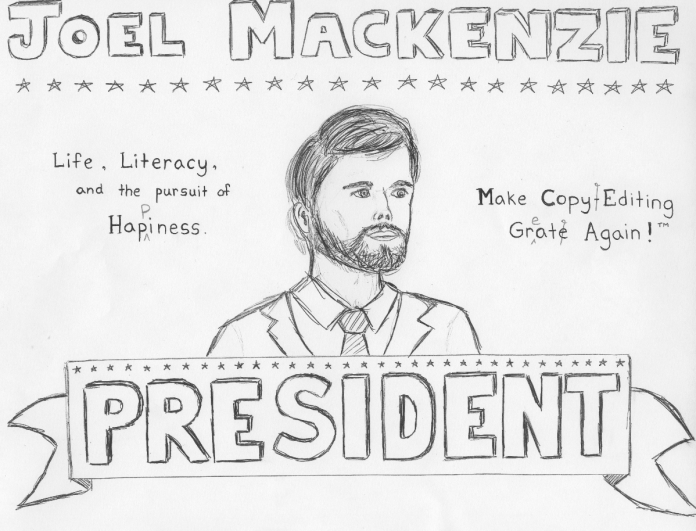[dropcap]D[/dropcap]angling modifiers are more important than the US election, because I can change dangling modifiers. Modifiers are clauses that precede a sentence. They define the subject in the sentence that is to come. A modifier is dangling when it modifies a subject that it isn’t intended to. Here’s an example: “Being so fit, the 50 km run was easy for Manpreet.” This sentence says that the 50 km run is what is fit.
What we probably want to say, though, is this: “Being so fit, Manpreet ran the 50 km run with ease.” In this case, Manpreet, the sentence subject, is fit.
Dangling modifiers can be hard to understand, but they can be changed by Canadians. The US election is hard to understand, but can’t be changed by Canadians.
If I can control my grammar, I can avoid misinterpretations, and needn’t be afraid.
One odd thing about grammar, though, is that it’s inherently forceful. It’s tempting to force people to follow the rules according to a specific grammar rule book, of which there are many. I follow the Canadian Press style, because it makes sense to me. It’s also my job as Copy Editor to make decisions about these sorts of things, and I think it’s okay to enforce this to make a newspaper cohesive.
But this can be a problem when we marginalize and punish for people not following difficult rules that often don’t really make sense. Doing so lends itself to judging people who don’t follow specific grammar rules, but who can probably get a point across just fine regardless.
Doing so can be kind of racist — like a prominent US presidential candidate.
Fortunately, grammar can still be fun to discuss, because we can change it. If we look at it from an open point of view, we can discuss what does and doesn’t make sense, and we can change the way we speak. This, in turn, affects the way we shape the stories of our lives. It’s not like the United States’ inevitable demand for Canadian fresh water in the coming years, which we can’t control.
It’s like we’re France in 1920, and we’re watching Mussolini in Italy.
Grammar really can shape lives. Think, for instance, about being mad. If you’re mad, are you mad? Or do you feel mad?
Now, if you tell yourself every time that you feel an emotion, rather than you are an emotion, how might those words affect your thinking? You might be more inclined to think of your emotions as a passing experience, rather than a consuming identity. It might make emotions feel a bit less important, and sometimes we need that.
Clearly, grammar is fun. And important. Unlike the United States election.
The election is important, of course, but not to Canadians, because we can’t affect it. We can’t control, for instance, that a frontrunner openly promotes the violence that occurs at his rallies.
Remember last summer when we thought he was just a joke candidate? That he’ll probably just drop out, and we’ll all be like, “well, that was weird! We learned a lot!” And we didn’t have to worry. But we can’t worry, because we’re Canadians, and that’s fine. We can control other things.
Even if every Canadian moved down there and voted for Bernie, we’d only make up about nine percent of the population. Nine percent.
But then if any of us did move there, we’d have to worry about a potential president who promises “worse than waterboarding.” It’s like he has no idea what he’s saying.
It’s like we’re France in 1920, and we’re watching Mussolini in Italy, and we’re like, “hey, guys, just stop it, look hard at him, he’s evil,” and Italy is all, “we need a strong leader, and all that racist stuff was just sarcasm.”
But we can control what we have. I have my grammar. I can control my grammar. And also American is an entire country, and they’ll probably figure it out.
We’ll be fine.






































